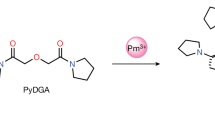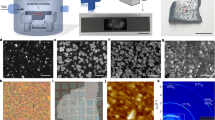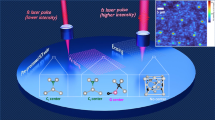Abstract
DURING a research on the synthesis of ammonia at room temperature under -ray bombardment and in presence of Fe3O4, we have found that the gas surrounding the -particle source emitted a relatively intense green glow. The -particle source was radon in a small thin glass bulb, through the walls of which the -particles could pass. The phenomenon is only observable when the iron oxide is reached by the -rays, and has been bombarded for several hours in a stoichiometric atmosphere (N2 + 3H2). When a certain amount of iron oxide has been thus in some manner promoted, it remains active in subsequent experiments, even if between two experiments it has been brought into contact with air.
This is a preview of subscription content, access via your institution
Access options
Subscribe to this journal
Receive 51 print issues and online access
$199.00 per year
only $3.90 per issue
Buy this article
- Purchase on Springer Link
- Instant access to full article PDF
Prices may be subject to local taxes which are calculated during checkout
Similar content being viewed by others
References
Proc. Roy. Soc., A, 72, 196, 409 (1903); 76, 488, 130 (1905).
Phys. Z., 6, 688 (1905); 7, 672 (1906).
Proc. Roy. Soc., A, 89, 39 (1914).
Astrophys. J., (1907) and 54, 149 (1921).
Z. Phys., 29, 345 (1924).
Author information
Authors and Affiliations
Rights and permissions
About this article
Cite this article
LUYCKX, A. Action of Iron Oxide on the Emission Spectrum of Nitrogen-Mercury Systems excited by -Rays. Nature 139, 672–673 (1937). https://doi.org/10.1038/139672a0
Issue Date:
DOI: https://doi.org/10.1038/139672a0
Comments
By submitting a comment you agree to abide by our Terms and Community Guidelines. If you find something abusive or that does not comply with our terms or guidelines please flag it as inappropriate.



